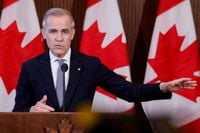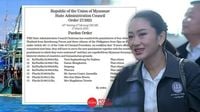On March 28, 2025, Nangsao Phetongtharn Shinawatra, the Prime Minister of Thailand, expressed her gratitude towards the Myanmar government for granting a pardon to four Thai fishermen, emphasizing the importance of maintaining strong bilateral relations. The fishermen had been detained in Myanmar since late November 2024 on charges of illegal fishing and unauthorized entry into the country.
Prime Minister Shinawatra shared her sentiments on social media, stating, "I am very pleased to receive information from the Foreign Minister that on March 27, the Myanmar government issued a pardon for the four Thai fishermen based on the good relationship between Thailand and Myanmar." She highlighted that the decision was a result of ongoing diplomatic efforts between the two nations.
The fishermen, identified as Sunan Mongkhonthong (68), Sompong Wiwattan (61), Thaworn Phromnimit (64), and Wirot Saphanthong (69), had been imprisoned for over four months. They were captured after a Myanmar naval vessel fired upon three Thai fishing boats, resulting in one fatality and two injuries. The Myanmar authorities had accused the fishermen of encroaching into their territorial waters.
In her statement, Shinawatra instructed the Foreign Minister to expedite the process of repatriating the fishermen to their families as soon as possible. She expressed her appreciation for the Myanmar government’s decision, acknowledging the collaborative efforts of the Thai Foreign Ministry and relevant agencies in securing the fishermen's release.
On the same day, during a Cabinet meeting at Government House, Shinawatra discussed various strategic issues, including the importance of enhancing Thailand's diplomatic relations and economic partnerships. The Cabinet approved several initiatives aimed at strengthening Thailand’s international standing and fostering cooperation with neighboring countries.
One significant area of focus is the automotive sector, where the Thai government is working to reduce trade barriers and enhance its competitive edge. The Cabinet has proposed measures to support the electric vehicle (EV) industry, including tax incentives for companies investing in the production of electric vehicles and components.
According to the Cabinet's resolutions, companies will benefit from a 100% corporate tax exemption on expenditures related to the production of large-scale commercial electric vehicles manufactured or assembled in Thailand. This initiative aims to encourage investments in clean energy and bolster the country's automotive industry.
Additionally, the government is revising language requirements for corporate entities to facilitate smoother business operations with international partners. This move is expected to attract foreign investments and enhance Thailand's trade relations.
In a broader context, the Thai government is also focusing on cultural diplomacy, aiming to promote Thailand's rich cultural heritage on the global stage. The Prime Minister emphasized the need for a comprehensive strategy to leverage cultural assets as a means of enhancing Thailand's international image and economic potential.
Meanwhile, the situation in Myanmar continues to be closely monitored, especially concerning its implications for regional stability and cooperation. The Thai government recognizes the importance of maintaining peaceful relations with its neighbors, particularly in light of recent developments in Myanmar's political landscape.
Shinawatra's administration is committed to fostering a collaborative approach to regional challenges, prioritizing diplomatic dialogue and mutual respect. The Prime Minister has reiterated that Thailand will continue to advocate for humanitarian considerations in its foreign policy, ensuring that the rights and welfare of individuals are upheld.
The recent pardon of the Thai fishermen serves as a testament to the potential for constructive dialogue and cooperation between Thailand and Myanmar. As both countries navigate their respective challenges, the emphasis on diplomacy and mutual understanding will be crucial in shaping their future interactions.
In conclusion, the Thai government's proactive approach in securing the release of the fishermen and its commitment to enhancing diplomatic relations with Myanmar reflects its broader strategy of fostering regional cooperation and stability. As Thailand continues to engage with its neighbors, the focus on building strong, equitable partnerships will remain at the forefront of its foreign policy agenda.







